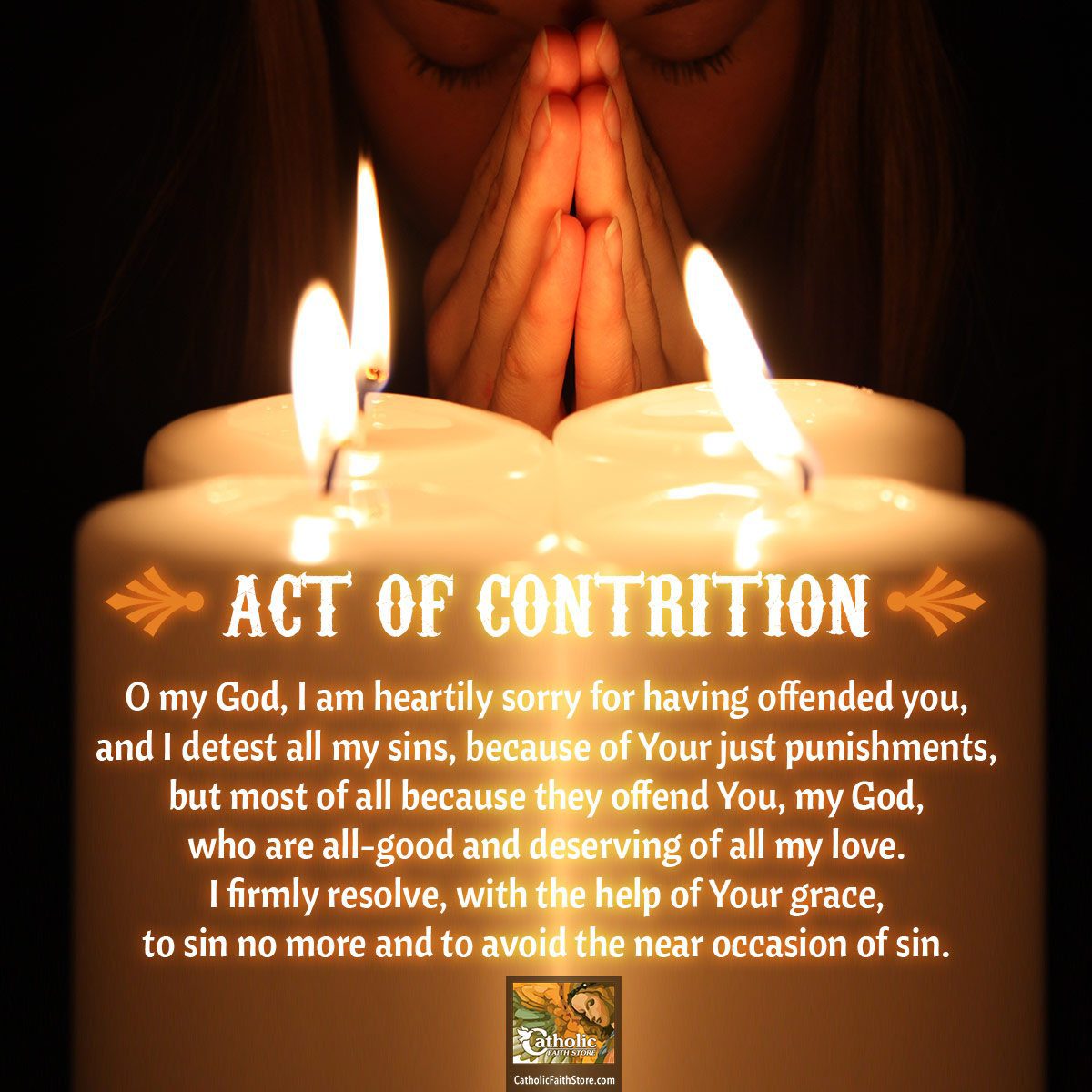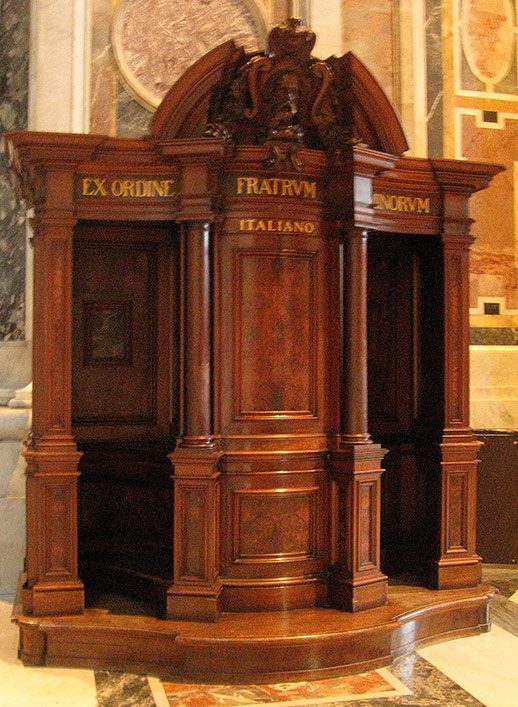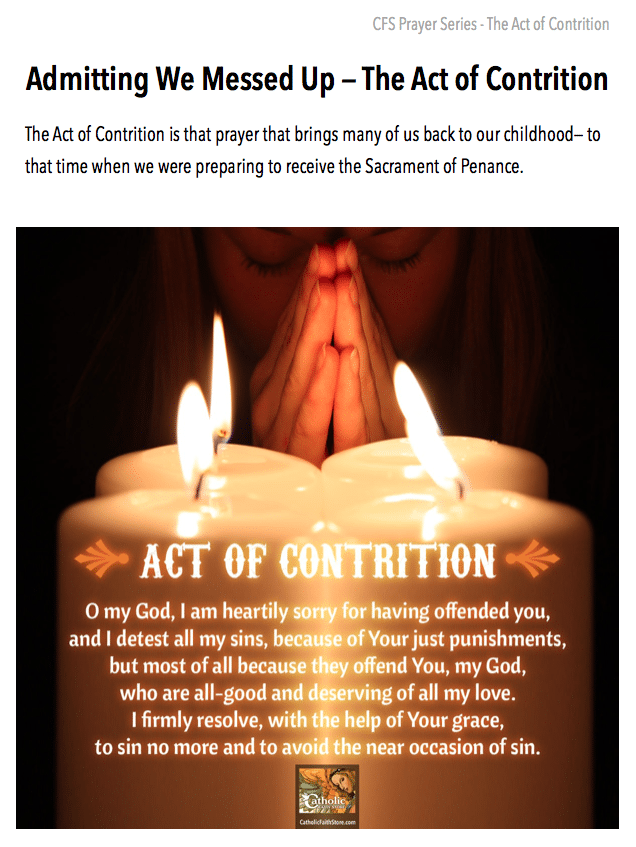What is the meaning of the Act of Contrition?
The Act of Contrition is that prayer that brings many of us back to our childhood— to that time when we were preparing to receive the Sacrament of Penance.

While we understood the meaning of the prayer on a basic level, as seven and eight year olds, our focus was more on memorizing the prayer and nervously hoping that we didn’t forget the words in front of the priest! As adults, we understand the Act of Contrition on a deeper level.
While it’s a simple prayer (easy enough for children to recite) it can be one of the hardest ones to say.
Why the Act of Contrition?
We understand that we have to face our Father and admit that we messed up and let Him down by sinning.
Why do we need to say this prayer of contrition?

Wouldn’t it be so easy if all we had to do to have our sins forgiven is to walk into a confessional, bow our heads in silence and have the priest absolve us of our sins? Unfortunately that’s not how it works. Before our sins can be forgiven, we must first humble ourselves before the Lord, by admitting out loud (in strict confidence to a priest) that we’ve sinned and confess each of those sins.
It’s similar to when you’re at fault for hurting a friend and you ask him or her for forgiveness. Usually you explain what you did wrong, ask them to forgive you, and tell them that you’ll try to do better going forward.
In the Act of Contrition, you’re having a similar conversation, but with God. While this seems like a scary prospect, the Sacrament of Penance is the best gift we can ever receive. We know that sin (especially mortal sin) separates us from God and that each time we sin that gap widens.
Through His mercy, God offers us a chance to close that gap each time we go to confession, and to be reconciled with Him.
The profound words of the prayer of contrition
O my God! I am heartily sorry for having offended You.
In this first line we are stating right away that we have offended God by sinning and that we’re not just sorry, but heartily (profoundly) sorry.
I detest all my sins, because I dread the loss of Heaven and the pains of Hell;
Here we’re admitting how much we hate our sins because we fear that our actions will lead us to face the pain and darkness of hell rather than the light of heaven.
But most of all because I have offended You, my God, who are all-good and deserving of all my love.
This is the most important line of the prayer. While we at first admit that we’re petrified that we’ll go to hell for our sins, the number one reason why we should be sorry for our sins is because they offend, hurt, and disappoint our God who deserves nothing but 100 percent of our love and adoration. In another version of the prayer, this line reads: “In choosing to do wrong and failing to do good, I have sinned against you whom I should love above all things.” The word “choosing” drives home the point that even though a little voice inside our head told us that what we were about to do was wrong, we ignored it and chose to sin anyway.
I firmly resolve, with the help of Your grace, to confess my sins, to do penance, and to amend my life. Amen.
The last line of the prayer is vowing that with the help of God’s grace, we’ll confess all of our sins, do penance (say a set of prayers or perform charitable acts as suggested by the priest), and make a commitment to not sin again. To never sin again is the ultimate goal—and the hardest part. As long as we are making an honest effort, that’s all that God asks.
Not just for the confessional
While the Act of Contrition is mainly said inside the confessional before a priest, it’s a good prayer to include as part of your evening prayer. Our conversation with God is usually spent asking Him for all the things we wish for and need (finding employment, good health, peace of mind, etc.,) along with thanking Him for all His blessings.
One thing we may not regularly do is examine our conscience to see how much of a “Christ-like” day we’ve lived versus a sinful one. “But I don’t steal, commit adultery, or defraud anyone, I’m o.k.” As humans, we are far from perfect and while we might not commit the “really bad” sins, there are those “little ones” that need to be forgiven and addressed as well: jealousy, anger, hatred towards someone, etc.
What’s in a name?
The Sacrament of Penance often goes by several other names and depending on your church you’ve heard it called:

Act of Contrition Printable Download
Enter your email address and we will send you the PDF version of the Act of Contrition guide for FREE.
